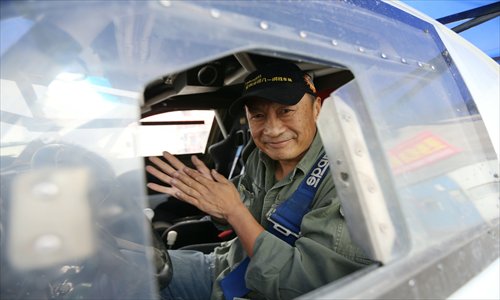Off-road addict recalls decade of twists, turns in the Taklimakan Rally

Photo: Cui Meng
When Zuo Xiaobing talks about his years of racing through Northwest China's desert, he stands tall with pride - just not quite as tall as he used to.
"I was 181 centimeters but now I'm just 179," the spry 58-year-old said, recalling a crash in 2010 that sent his vehicle twisting in the air, along with his spine.
"At that time the doctor told me I would never be able to race again."
Two years later, Zuo was back in the Taklimakan Rally - the grueling 15-day off-road scramble covering more than 10,000 kilometers through the Xinjiang Autonomous Region.
Zuo was first driven to Xinjiang 20 years earlier by a sense of adventure - and financial pressure.
After a long stint at a State-owned company in his native Xi'an, Zuo ventured on his own business. It went bankrupt in the early 1990s.
Saddled with debt, Zuo headed west in 1996, where he found work as a salesperson. He now owns an electronic equipment business in Urumqi.
"I developed health problems from working too hard during my early years," Zuo said. "After paying off all my debts, I realized I had to make a change."
As a remedy, Zuo took up exercise. But when years of hiking and mountaineering began wearing on his knees, Zuo turned to motorsports.
He soon discovered that racing, like business, can be an expensive enterprise.
"Most of the money I earned these years, millions of yuan, I've spent on racing," Zuo said.
But Zuo is a die-hard off-roader, and the Taklimakan Rally is his favorite race - one he admittedly has little hope of winning. "I've never finished without getting time penalties," he said.
Only the tough survive
First held in 2005, the Taklimakan is dubbed the "Oriental Dakar Rally," with many participants regularly taking part in both races.
Similar to its Saharan sister, the Taklimakan Rally runs through one of the world's largest shifting sand deserts, where racers on dirt bikes, in dune buggies and other off-road vehicles kick up dust through the region's rugged landscapes and extreme weather conditions.
"We've seen all kinds of weather in the desert, except snow," said Zuo, laughing.
The 2016 Rally, which partially looped into Kazakhstan, saw less than 15 percent of the racers finish all 14 of the race's treacherous stages before ending on May 30.
"The first stage is designed to be the easiest one, so all drivers should have completed it with ease," Zuo said.
"But due to a torrential downpour, the track turned into a swamp and tens of cars were trapped in the mud. Some of them were still trapped there even after four days."
But there is one challenge that stands out for Zuo - the 600-kilometer-long marathon stage of the 2015 Rally.
"It was 40 C inside the car, and the land surface temperature was over 70 C," Zuo recalled of the eight-hour stage.
"It was hot, humid, stuffy in the car, but I didn't dare open the window because the air outside was much worse. So I took off my coat, and my arms were sticky with sweat and dust on them."
With 100 kilometers to go, Zuo began feeling faint from dehydration.
"I needed to up my salt intake … but I had already eaten all the salted eggs that I brought along for the journey. So I began licking my arms, since they were salty from my sweat. This way I began to feel better and managed to make it to the finish line."
"Many racers shed tears after finishing that stage," he said.
Pains and gains
After his spine-shortening injury in 2010, Zuo put the brakes on his racing career. But he didn't stay idle for long.
In 2012, he took a gamble on his health and joined the 428 Tibetan Plateau Rally, a race shorter and less taxing than the Taklimakan.
"I thought at the time, 'If I don't finish the 428, OK, I'll give up and never race again. But if I manage to finish it, I'll continue my career."
He placed first.
Zuo said he often gets asked why he continues to suffer through the Taklimakan if he has no chance of victory.
His response is a winner.
"All men live for others in their daily lives. You may be a supervisor or a subordinate, you're some else's father, husband, son or brother. You're always living for other people. But sometimes a man needs some time to forget his social obligations and be himself, and for me the Taklimakan Rally is exactly what I need."
"It is tough, but I just don't want to give up this hobby. It feels really great to live for myself during this time."
Newspaper headline: Blood, sweat and gears